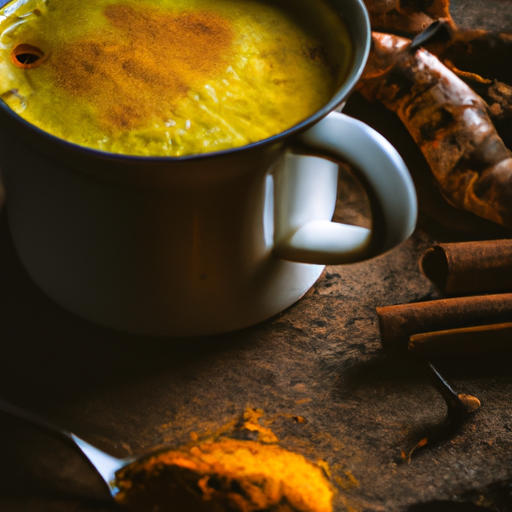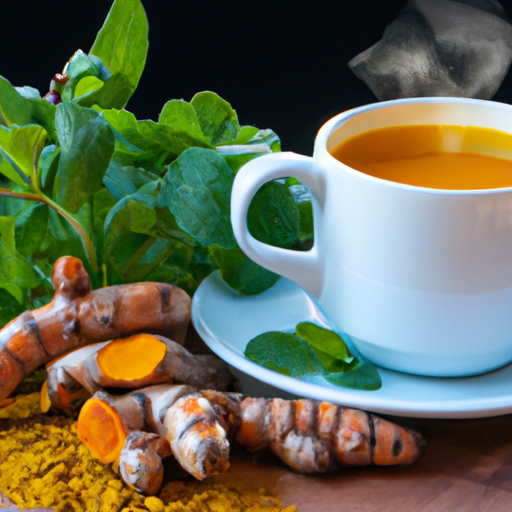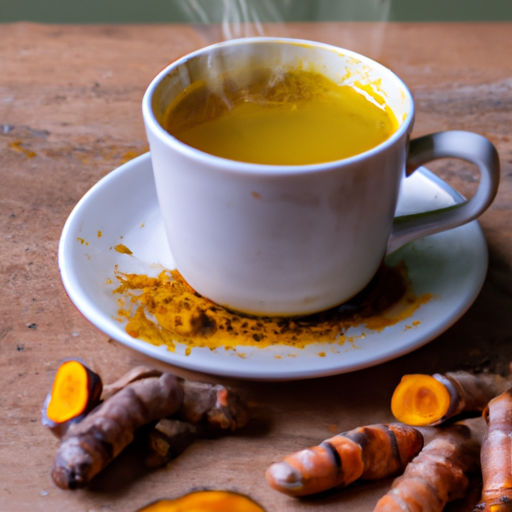As a person who is constantly seeking natural methods to enhance my well-being, I have developed a newfound interest in the advantages of turmeric tea. Turmeric has been utilized in alternative medicine for its anti-inflammatory and antioxidant qualities, leading many to believe that consuming turmeric tea may aid in addressing a range of health concerns.
But as with any natural remedy, it’s important to know how long it takes for turmeric tea to work and what factors can affect its effectiveness. In this article, we’ll explore the active compound in turmeric, the potential health benefits of turmeric tea, how to make it, and most importantly, how long you can expect it to take before you start seeing results.
So if you’re considering adding turmeric tea to your daily routine or just curious about its potential benefits, keep reading!
Key Takeaways
- The effectiveness of turmeric tea varies depending on individual metabolism and absorption ability, as well as dosage, frequency of consumption, and quality of turmeric.
- Consuming turmeric with healthy fats increases its bioavailability, while taking it on an empty stomach can lead to poor absorption.
- Most adults can safely consume up to 400-600 milligrams of curcumin per day, but high doses may not necessarily result in higher absorption.
- Possible risks and side effects of excessive consumption include nausea, diarrhea, dizziness, increased risk of bleeding, interactions with certain medications, and gallbladder problems, and pregnant or breastfeeding women or those with a history of liver disease or gallbladder problems should consult with their healthcare provider before drinking turmeric tea regularly.
The Active Compound in Turmeric
Do you know what makes turmeric tea so effective? It’s all thanks to the active compound called curcumin. Curcumin is a polyphenol that gives turmeric its signature yellow color and has been found to have anti-inflammatory, antioxidant, and antimicrobial properties.
However, it’s not just the presence of curcumin in turmeric that makes it effective; it’s also how well our bodies are able to absorb and utilize this compound. One of the biggest challenges with curcumin is its low bioavailability, meaning that our bodies don’t absorb it very well.
In fact, studies show that less than 5% of curcumin taken orally is actually absorbed into the bloodstream. This is because curcumin is rapidly metabolized by the liver and excreted from the body before it has a chance to be fully utilized. To combat this issue, there are several strategies for increasing curcumin bioavailability, such as consuming turmeric with black pepper or combining it with healthy fats like coconut oil.
These factors that affect the effectiveness of turmeric tea can greatly impact how quickly you notice its benefits in your body.
Factors That Affect the Effectiveness of Turmeric Tea
The effectiveness of turmeric tea depends on various factors, such as the quality of the ingredients used and the method of preparation. One of the most significant factors influencing absorption is the addition of black pepper to turmeric tea. Black pepper contains piperine, a compound that enhances curcumin’s bioavailability by up to 2000%. Therefore, adding a pinch of black pepper to your turmeric tea can significantly increase its effectiveness.
Another factor that affects turmeric tea’s efficacy is dosage. The optimal dosage for turmeric varies depending on age, gender, health status, and other factors. However, studies indicate that consuming between 500mg to 2g of curcumin daily may provide health benefits. It is crucial to note that excessive intake may lead to adverse effects such as nausea and diarrhea. Thus it’s essential to consult with a healthcare provider before taking any supplements or herbal remedies.
Understanding how different factors affect the effectiveness of turmeric tea can help you reap its maximum health benefits without experiencing any adverse effects. In the next section, we will explore some potential health benefits associated with regular consumption of turmeric tea.
Potential Health Benefits of Turmeric Tea
Imagine how much better you’ll feel after regularly drinking turmeric tea, as it has the potential to provide a multitude of health benefits. One of the most notable benefits is its ability to reduce inflammation in the body. Turmeric contains a powerful compound called curcumin, which has been shown to have anti-inflammatory properties. By reducing inflammation, turmeric tea may be able to improve conditions such as arthritis and even lower the risk of chronic diseases like heart disease.
In addition to its anti-inflammatory effects, turmeric tea can also aid in digestion. The compounds found in turmeric may help increase bile production and improve overall gut health. This improved digestion can lead to reduced bloating and discomfort after meals.
Overall, incorporating turmeric tea into your daily routine may provide numerous health benefits that could greatly improve your quality of life.
Transitioning into the subsequent section about how to make turmeric tea, making this drink at home is simple and easy!
How to Make Turmeric Tea
To make turmeric tea, all you need is some grated ginger, a pinch of black pepper, honey and hot water. These ingredients will not only give the tea an inviting flavor profile but also enhance the absorption of curcumin in your body. Curcumin is the active compound found in turmeric that has been linked to various health benefits.
Here’s a table outlining some of the potential health benefits of consuming turmeric tea:
| Health Benefit | Description |
|---|---|
| Anti-inflammatory properties | May help reduce inflammation and swelling in the body |
| Antioxidant properties | May protect against oxidative damage caused by free radicals |
| Improved brain function | May improve memory and cognitive function |
| Reduced risk of heart disease | May lower cholesterol levels and improve blood vessel function |
Turmeric tea benefits are aplenty, making it a popular drink among those who want to enjoy its therapeutic effects while indulging in a warm cuppa. Now let’s move on to understanding how long it takes for turmeric tea to work.
How Long Does It Take for Turmeric Tea to Work?
I’ve found that there isn’t a consensus on how long it takes for turmeric tea to work. The effects of turmeric can vary depending on the individual’s metabolism and absorption ability. There are also factors such as dosage, frequency of consumption, and the quality of the turmeric used that can affect its effectiveness.
To summarize, the time it takes for turmeric tea to work can vary for each person and is influenced by several factors. Therefore, it’s best to be patient and consistent in consuming turmeric tea to achieve its potential health benefits.
Lack of Consensus
There’s no agreement on how long turmeric tea takes to show its benefits. The turmeric tea controversy arises from conflicting opinions among experts, leading to confusion for those seeking its health benefits.
Some studies suggest that the effects of turmeric may be seen within a few weeks, while others claim it can take up to several months before any changes are observed. However, individual variations also play a significant role in determining the time frame for the effects of turmeric tea.
Factors such as age, health status, lifestyle habits, and genetics may determine how quickly one responds to this herbal remedy. Hence it’s important not to get discouraged if you don’t see immediate results after drinking turmeric tea regularly.
It’s advisable to consult with your healthcare provider before incorporating any new supplements into your diet and monitor progress over time patiently.
Individual Variations
While there’s no consensus on how long it takes for turmeric tea to work, individual variations play a significant role in determining the effects.
Some people may experience the benefits of turmeric tea immediately after drinking it, while others may need to consume it regularly over a period of time before noticing any changes.
This variability can be attributed to several factors, such as dosage variations and individual response.
Dosage variations refer to the amount of turmeric used in making the tea. While some individuals may require a small amount of turmeric to experience its therapeutic effects, others may need higher dosages.
Similarly, an individual’s response to turmeric tea can vary depending on their overall health status and genetic makeup.
These differences in dosage requirements and responses make it difficult to determine how long it will take for an individual to notice any changes after consuming turmeric tea regularly.
When considering factors that affect absorption, several things come into play that can impact how quickly or efficiently your body absorbs turmeric from your tea.
Factors That Affect Absorption
Understanding the factors that impact absorption is key to maximizing the benefits of turmeric tea. Two significant factors affecting absorption are food and dosage.
Taking turmeric on an empty stomach can lead to poor absorption, so it’s recommended to consume it with a meal containing healthy fats, such as avocado or nuts. Healthy fats help increase the bioavailability of turmeric by enhancing its solubility in fat.
Another factor that affects absorption is dosage. Turmeric contains a compound called curcumin, which is responsible for its many health benefits. However, curcumin has low bioavailability, meaning our bodies find it difficult to absorb and utilize this compound effectively when taken alone. Therefore, taking high doses of turmeric may not necessarily result in higher levels of curcumin in the bloodstream.
Instead, taking supplements formulated with piperine (found in black pepper) or liposomal technology can significantly enhance curcumin’s bioavailability and effectiveness.
Understanding these factors can help us optimize the consumption of turmeric tea for maximum benefit. In the subsequent section about studies on the effectiveness of turmeric, we’ll explore how different dosages and forms have been researched for their health benefits.
Studies on the Effectiveness of Turmeric
You’ll be glad to know that studies have shown turmeric to be effective in reducing inflammation and aiding digestion. Turmeric contains a compound called curcumin, which has been found to have anti-inflammatory properties and can help alleviate symptoms of conditions such as osteoarthritis and rheumatoid arthritis.
In addition, turmeric has been shown to improve digestive health by increasing bile production and reducing inflammation in the gut. When it comes to taking turmeric for its health benefits, it’s important to consider its bioavailability and dosing recommendations.
Curcumin isn’t easily absorbed by the body on its own, but can be enhanced with the presence of black pepper or piperine. As for dosing recommendations, studies have suggested taking 500-2,000 milligrams of curcumin per day for optimal therapeutic effect. It’s always best to consult with a healthcare professional before starting any new supplement regimen.
Moving on to potential side effects and risks…
Potential Side Effects and Risks
As I’m researching the potential benefits and risks of consuming turmeric, I’ve come across some important information about its potential side effects. It’s crucial to be aware of these risks before incorporating turmeric into your diet or supplement regimen.
Some key points to consider include interactions with medications. Also, allergic reactions and digestive issues may arise from consuming turmeric.
Interactions with Medications
Turmeric tea can potentially interact with medications, so it’s important to talk to a healthcare provider before incorporating it into your routine. This is because turmeric contains compounds that may interfere with certain drugs’ effectiveness or increase the risk of side effects. For example, turmeric may interact with blood thinners like warfarin, increasing the risk of bleeding.
If you’re taking any medication, ask your healthcare provider about whether it’s safe to consume turmeric tea and if dosage adjustments are necessary. It’s better to be cautious and avoid potential drug interactions than to experience adverse effects.
Next, let’s discuss allergic reactions that may occur after consuming turmeric tea.
Allergic Reactions
As I mentioned earlier, turmeric tea can interact with certain medications. However, another potential concern to be aware of is the possibility of allergic reactions. While rare, some individuals may experience an allergic reaction to turmeric or its active ingredient, curcumin.
Common symptoms of an allergic reaction include hives, itching, swelling, and difficulty breathing. In severe cases, anaphylaxis can occur which requires immediate medical attention. Treatment options for mild to moderate allergic reactions typically involve antihistamines or corticosteroids.
If you suspect that you’re experiencing an allergic reaction after consuming turmeric tea or any other product containing turmeric or curcumin, it’s important to seek medical attention right away.
Moving forward into the next section about digestive issues…
Digestive Issues
Digestive issues can arise when consuming turmeric tea, and it’s important to be aware of potential symptoms and seek medical attention if necessary. Some common remedies for digestive discomfort include drinking plenty of water, avoiding spicy or fatty foods, and taking over-the-counter antacids. If symptoms persist or worsen, alternative treatments such as probiotics or herbal supplements may be recommended.
To better understand the potential digestive effects of turmeric tea, let’s take a look at some possible symptoms and their causes. The following table outlines common digestive issues associated with turmeric consumption:
| Symptom | Cause | Treatment |
|---|---|---|
| Nausea | Stimulates bile production | Ginger tea or peppermint oil |
| Diarrhea | Increases bowel movements | Hydration and rest |
| Stomach pain/cramps | Irritates stomach lining | Antacids or chamomile tea |
It’s important to note that not everyone will experience these side effects, but being aware of them can help individuals make informed decisions about their use of turmeric tea. Other ways to consume turmeric include adding it to meals as a spice or taking it in supplement form.
Other Ways to Consume Turmeric
I’ve found that there are many other ways to consume turmeric besides drinking it as tea. For example, you can take supplements that contain curcumin, the active ingredient in turmeric.
Additionally, turmeric is commonly used in curries and other dishes for its flavor and health benefits.
Finally, some people even use topical applications of turmeric to help with skin conditions like acne or eczema.
There are plenty of options available for incorporating this powerful spice into your daily routine!
Supplements
If you’re looking to maximize the benefits of turmeric, taking a high-quality supplement can be an effective option. However, it’s important to note that the supplement dosage may vary depending on the manufacturer and concentration of curcuminoids, which are the active compounds found in turmeric.
Generally, a daily dose of 500-2,000 mg of curcuminoids is recommended for therapeutic purposes. It’s also important to consider possible interactions with other medications or health conditions before taking a turmeric supplement. For example, turmeric may interact with blood thinners and antiplatelet drugs, so it’s best to consult with a healthcare provider before starting any new supplement regimen.
With proper guidance and precautions taken into account, a turmeric supplement can offer convenient and potentially beneficial support for overall health and wellness. Now let’s move on to discussing how you can incorporate turmeric into your diet through curries and other dishes.
Curries and Other Dishes
To add a burst of flavor and color to your meals, try incorporating turmeric into your favorite curries and dishes. Turmeric has a warm, slightly bitter taste with hints of ginger and orange. It is commonly used in Indian cuisine, but can also be found in Middle Eastern and Southeast Asian dishes.
Here are some recipe ideas for incorporating turmeric into your curries:
- Chicken Tikka Masala: This classic Indian dish features marinated chicken cooked in a creamy tomato sauce with spices including turmeric.
- Yellow Curry: Add turmeric to coconut milk-based curry for a vibrant yellow color and added flavor.
- Roasted Vegetables: Toss vegetables such as cauliflower or carrots in olive oil and turmeric before roasting for a flavorful side dish.
Turmeric tea is often compared to other herbal teas such as chamomile or green tea, but it has its own unique benefits. While all herbal teas have antioxidant properties, turmeric contains the compound curcumin which has anti-inflammatory effects. Turmeric tea can also aid digestion and help boost the immune system. Incorporating turmeric into your diet through both curries and tea can provide various health benefits.
Moving onto topical applications…
Topical Applications
You can spice up your skincare routine by incorporating turmeric into your topical applications. Turmeric tea has many benefits when used topically, thanks to its anti-inflammatory and antioxidant properties. It can help reduce redness, puffiness, and acne scars while providing a natural glow to the skin.
Turmeric tea can be mixed with other ingredients such as honey or yogurt to create a face mask that helps brighten and even out skin tone. Additionally, it can be used as a spot treatment for acne breakouts due to its antibacterial properties. However, it’s important to note that turmeric can stain clothing and temporarily tint the skin yellow, so it should be rinsed off thoroughly after use.
Moving on to precautions and considerations…
Precautions and Considerations
Before incorporating turmeric into my diet, I always consult with my healthcare provider to ensure that it’s safe and appropriate for me. It’s important to avoid excessive consumption of turmeric as it may lead to stomach upset or other adverse effects.
Additionally, choosing high-quality turmeric from a reputable source can help ensure its potency and purity.
Consulting with a Healthcare Provider
Consulting with a healthcare provider is always the best option when it comes to determining how long turmeric tea will take to work. While turmeric is generally considered safe, there are still potential risks associated with its consumption that could affect an individual’s health. This is especially true for those who have an existing medical condition or are taking medication that might interact with the compounds found in turmeric.
To help you understand how consulting a healthcare provider can benefit you, here’s a table summarizing some of the potential risks and side effects of consuming turmeric tea:
| Potential Risks | Possible Side Effects |
|---|---|
| Increased risk of bleeding | Stomach upset and diarrhea |
| Interactions with certain medications | Skin irritation and allergic reactions |
| Gallbladder problems | Lowered blood sugar levels |
A healthcare provider consultation can also provide insight into how long it may take for turmeric tea to work based on your individual circumstances. Factors such as age, weight, and overall health status can all influence the efficacy of turmeric tea. By seeking expert advice, you’ll be able to make informed decisions about incorporating this spice into your daily routine.
It’s important to note that while drinking turmeric tea in moderation is generally safe for most people, excessive consumption can lead to adverse effects. In our next section, we’ll discuss tips on avoiding excessive consumption and ensuring that you reap all the benefits of this powerful spice without putting your health at risk.
Avoiding Excessive Consumption
To prevent any potential adverse effects, it’s crucial to consume turmeric tea in moderation. While turmeric is generally considered safe, excessive consumption may lead to unwanted symptoms such as nausea, diarrhea, and dizziness.
Therefore, it’s important to follow the recommended dosage of turmeric tea and not exceed it. The ideal dose of turmeric tea can vary depending on a person’s age, gender, weight, and health status.
As a general guideline, most adults can safely consume up to 400-600 milligrams of curcumin per day. However, if you’re pregnant or breastfeeding or have a history of liver disease or gallbladder problems, you should consult with your healthcare provider before drinking turmeric tea regularly.
By consuming turmeric tea in moderation and following the appropriate dosage guidelines for your needs and health status, you can minimize the risk of experiencing any potential adverse effects from this powerful herb. In order to fully reap the benefits of turmeric tea without worrying about safety concerns or quality issues later on down the line, choosing high-quality turmeric is essential.
Choosing High-Quality Turmeric
You might think that any old turmeric will do, but let’s be real – if you want to get the most out of your turmeric tea, you need to choose high-quality turmeric.
One important aspect of choosing high-quality turmeric is ensuring that it’s sourced from a reputable supplier. Ideally, the supplier should have a direct relationship with farmers who grow and harvest the turmeric. This way, you can be sure that the turmeric is grown using sustainable methods and without harmful chemicals.
Another important factor in choosing high-quality turmeric is purity testing. Look for brands that perform third-party lab testing on their products to ensure they’re free from contaminants such as heavy metals or pesticides.
You can also check if the product has been certified by organizations such as USDA Organic or Non-GMO Project Verified, which ensures that the product meets certain standards for quality and purity.
By taking these steps to choose high-quality turmeric for your tea, you can be confident that you’re getting the best possible benefits from this powerful spice.
Frequently Asked Questions
Can turmeric tea be consumed by pregnant or breastfeeding women?
As a pregnant or breastfeeding woman, I should consider the benefits and risks of consuming turmeric tea. While it may have anti-inflammatory properties, it’s important to take precautions as there is limited research on its safety. Alternatives such as ginger tea may be a safer option.
Is there a recommended dosage for consuming turmeric tea?
For optimal health benefits, the recommended turmeric tea dosage is 500-2000 mg of curcumin per day. However, excessive consumption can lead to potential side effects like diarrhea and nausea. Always consult with a healthcare provider before increasing intake.
Can turmeric tea be consumed in combination with other medications or supplements?
Combining turmeric tea with medication or supplements may lead to interactions. It’s best to consult a healthcare provider before consuming turmeric tea if you’re taking any medications or supplements, as it may interfere with their effectiveness.
How long does the effect of turmeric tea last once consumed?
I can’t say how quickly turmeric tea works, but I know it provides long term benefits like reducing inflammation and promoting heart health. However, there are potential risks for those taking certain medications or with liver issues.
Are there any specific brands or types of turmeric that are recommended for making turmeric tea?
After researching, I found that there are many brands and types of turmeric that can be used for making turmeric tea. Some popular ones include organic turmeric powder and fresh turmeric root. However, it’s important to note the potential benefits and drawbacks of consuming too much turmeric tea.
Conclusion
Well, folks, there you have it. Turmeric tea is a powerful drink that can provide numerous health benefits when consumed regularly and correctly. It’s loaded with curcumin, a powerful antioxidant and anti-inflammatory compound that can help boost your immune system, improve digestion, reduce inflammation in your body, and promote heart health.
But how long does it take for turmeric tea to work? Well, the answer varies from person to person depending on factors like age, weight, overall health status, and the quality of the turmeric used. However, most studies suggest that you may start experiencing some benefits within a few weeks of drinking turmeric tea regularly.
So go ahead and give it a try! But remember to consult with your healthcare provider first if you have any underlying medical conditions or are taking medications that could interact with this herb.
In conclusion, don’t underestimate the power of this yellow spice! From adding flavor to food to fighting chronic diseases like cancer and Alzheimer’s disease; turmeric has been used for centuries by ancient healers as an effective natural remedy. So why not try incorporating some into your daily routine? And who knows – maybe it’ll become your new go-to ‘secret sauce’ for optimal health and wellness!










